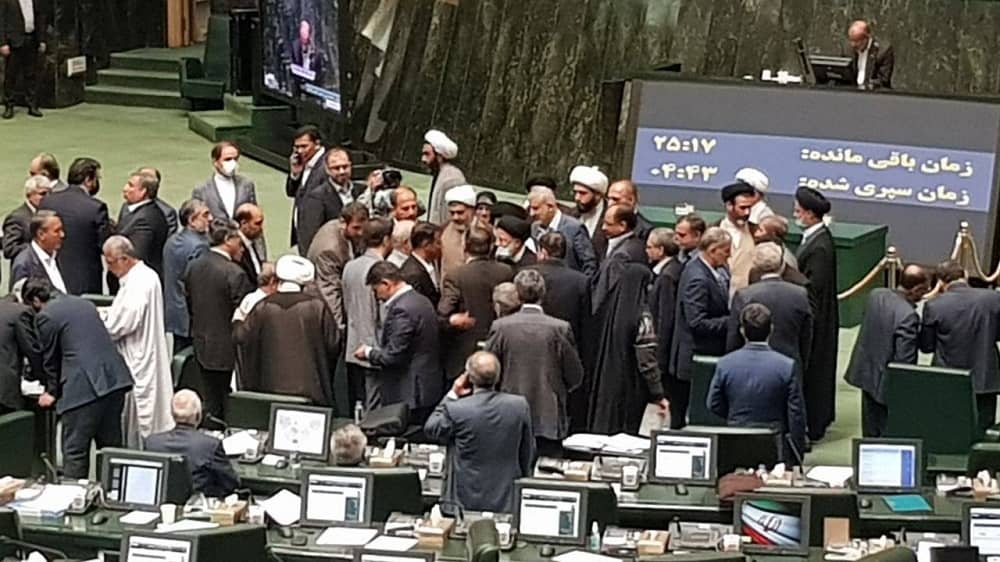Facebook
Twitter
LinkedIn
Pinterest
Reddit
Email
Print
 Dispute erupts in Iranian regime’s parliament (Majlis)
Dispute erupts in Iranian regime’s parliament (Majlis)
Three-minute read
In a rare moment of candor, Iran regime’s parliament this week became a stage for open confessions about the country’s deepening economic and social collapse.
According to the state-run Mehr News Agency, Hamidreza Hajibabaei, deputy speaker of the regime’s parliament, devoted his October 8 pre-session speech to a desperate appeal for public appeasement. “The most important issue for us in the parliament is public satisfaction,” he said, admitting that “people are upset about rising prices,” and insisting that the regime is working “with full power” to restore public trust.
Similar statements were echoed on October 5, when several MPs—including Abbas Goodarzi, Mansour Alimardani, Javad Nikbin, and Hossein Samsami—lamented that “the people can no longer bear the burden of soaring prices.” Yet beyond rhetoric, their words reveal not genuine concern for citizens’ welfare, but growing alarm over the political consequences of widespread poverty.
#Iranian Officials and Analysts Sound Alarm Over Imminent Social Explosionhttps://t.co/Ag4aIychti
— NCRI-FAC (@iran_policy) March 29, 2025
Admissions of Collapse
Alimardani openly stated: “The economy is facing unprecedented pressure. Purchasing power has collapsed, and inflation weighs heavily on people’s tables. Wages rise once a year, but prices rise weekly—sometimes hourly. The salaries of retirees, villagers, and nomads cannot even cover one decent meal.”
Hossein Samsami, another regime lawmaker, warned: “What we are witnessing now is runaway inflation. Liquidity has increased 6.5 times in eight years, and the price of gold coins has risen 60-fold.”
He went on to compare the current crisis to the Iran–Iraq War era, noting that while the currency and basic goods were stable during the war, “in the past six years the official exchange rate (against the US dollar) has multiplied 16 times,” calling it the root of the present economic chaos.
These admissions go beyond economic commentary—they amount to an indictment of the regime’s governing model. Even the regime’s own MPs are now conceding that the system is structurally bankrupt.
#Iran’s Regime Fears Impending Social Explosion Amid Worsening #Economic and Social Criseshttps://t.co/h9e5afgF4l
— NCRI-FAC (@iran_policy) March 4, 2025
The Real Source of the Crisis
Nikbin and Goodarzi, in the same session, attempted to frame the crisis as a problem of “poor government oversight” and “mismanagement.” But such claims ring hollow in a system where all major economic decisions are dictated by unelected and unaccountable security bodies under Ali Khamenei’s command.
In truth, as observers note, the core of Iran’s economic devastation lies in the regime’s corruption and its diversion of national wealth toward regional proxies and the military-industrial complex. Lawmakers’ talk of “oversight” and “protection of the people” merely reflects their fear of an approaching public backlash.
#IranProtests Resurge as Former MP Warns Nation Is a “Dormant Volcano” Amid Economic Ruin and Repressionhttps://t.co/3AyfjcN1QL
— NCRI-FAC (@iran_policy) July 2, 2025
Fear of an Uprising
Behind these statements lies a single, unspoken anxiety: the fear of a nationwide uprising. In a country that has witnessed multiple nationwide protests in recent years, the regime’s own officials now speak in tones of warning to the top leadership. Terms such as “serious reminders,” “oversight,” or “exchange rate reform” are veiled alarms directed at the very center of power.
The collapse of purchasing power, the free fall of the rial, and a 200 percent surge in essential food prices have transformed economic indicators into warning signs of impending social breakdown. Retirees, villagers, and workers can no longer afford a decent living, pushing the social fabric to the brink of explosion.
Amid Fear of Social Explosion, #Iranian State Officials Sound Alarm Over Raisi Government’s #Economic Failureshttps://t.co/tD3QbIGwCc
— NCRI-FAC (@iran_policy) April 29, 2024
A System Beyond Repair
The October sessions of parliament, far from being economic debates, were scenes of panic—reflections of a regime that senses its foundations crumbling. Even its most loyal figures now fear the wrath of the impoverished majority.
The lawmakers’ speeches were not protests against poverty, but admissions that the clerical regime can no longer reproduce economic or social stability. The soaring cost of living is not merely a symptom of economic failure—it is the visible manifestation of a deeper collapse: a crisis of legitimacy and survival for a regime that the Iranian people have rejected long ago.